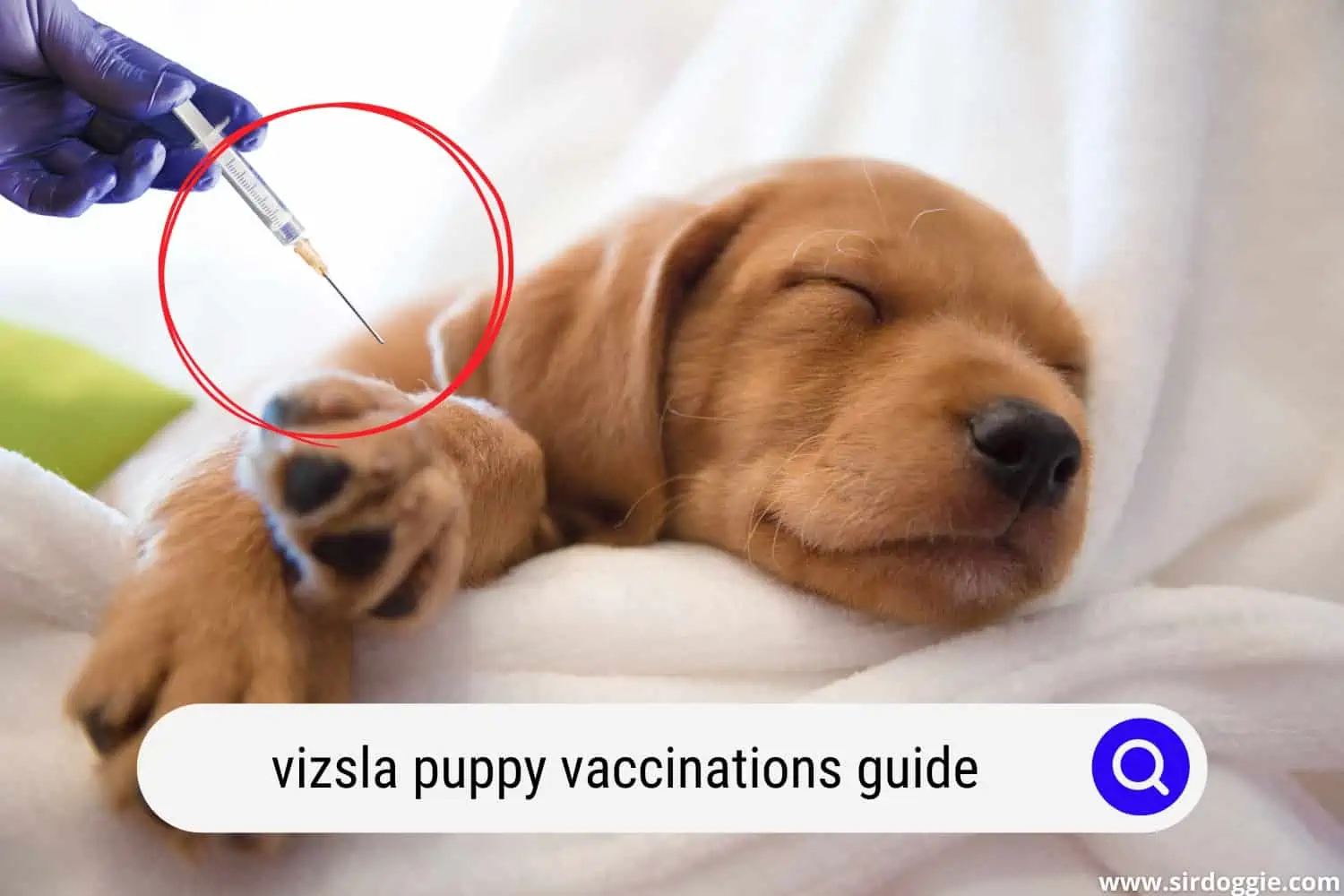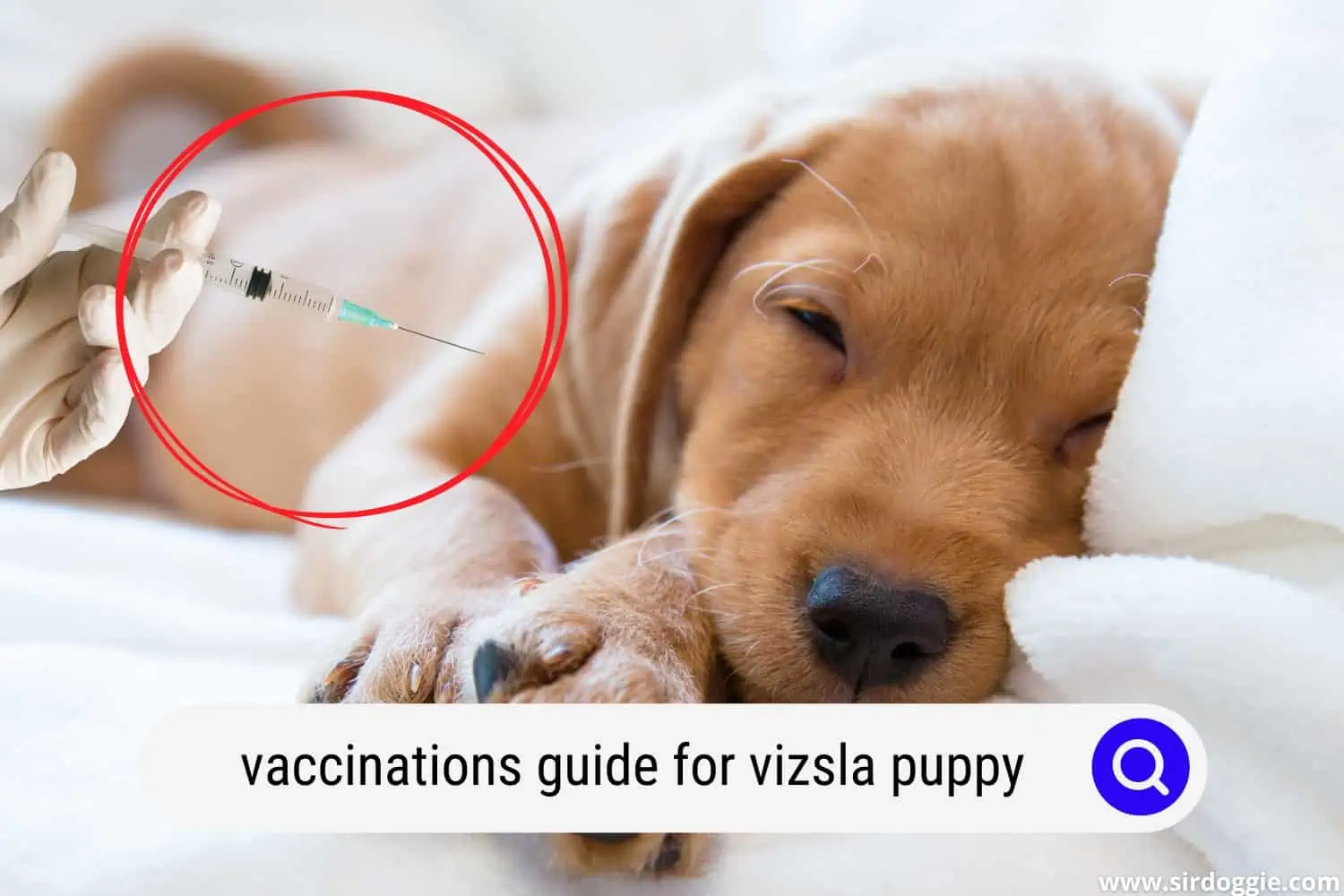Vizsla Puppy Vaccinations Guide
As pet owners, our main responsibility is to ensure their health to have a peaceful and happy life. It does not matter if it is a dog, cat, or any other animal; we must make sure that they are healthy all the time and try to prevent them from suffering from diseases.

In this particular case, we will talk about the Vizsla puppies. This type of dog has various characteristics that make it special to live harmoniously with a family. They are very active dogs characterized by their high level of physical activity and their need to exercise daily.
Also, it should be noted that Vizslas are quite affectionate and friendly with members of their human family, strangers, and other animals.
Unlike other dogs, this breed is usually healthy, but depending on the care that its owner provides, they can suffer from certain diseases. That is why it is essential to know the guidelines to follow to vaccinate our puppy and prevent it from suffering from any disease.
Vizsla Puppy Vaccinations Guide
As we all know, having a dog is a great responsibility and commitment. As owners, we must guarantee the highest quality of life for our pets, and that includes being attentive to any illness they may suffer. If our puppies are not vaccinated, they will be exposed at any time to dangerous and deadly diseases.
The vaccination of your Vizsla puppy will depend on the specifications indicated by a veterinarian since he is the one who knows all the characteristics of the animal. The most common is that the specialist vaccinates your puppy with the most necessary vaccines to avoid dangerous (or fatal) diseases.
Generally, the vaccines that we should use in a Vizsla puppy are the same as those used in other dogs since they all have similar organisms. It should be noted that there are mandatory vaccines and optional vaccines. The mandatory ones should be administered to all dogs, while the optional ones should only be applied depending on the Vizsla puppy’s lifestyle or geographic location.
The vaccinations you should consider for your Vizsla puppy are used to protect against:
Vizsla Vaccination: Bordetella
It is a bacterium that can affect the canine in many ways causing vomiting, seizures, cough (being one of the main symptoms), and in very extreme cases, death. In fact, this infectious agent is the cause of the well-known kennel cough.
The application of a vaccine to combat this disease is mandatory and essential in social places where you can take your puppy. The vet may decide to administer this vaccine either through an injection or nasal spray. We have to consider that the immunity of this vaccine lasts approximately 12 to 14 months.
Vizsla Vaccination: Kennel Cough
As we have seen previously, one of the main causes of kennel cough is the infectious bacteria known as Bordetella. However, keep in mind that this is not the only trigger for kennel cough. This disease can also be caused by other bacterial or viral infections such as canine parainfluenza.
Kennel cough is considered a respiratory disease, also known as infectious tracheobronchitis. It starts when the upper airways become inflamed.
In most cases, kennel cough is a mild illness that causes a strong, dry cough. However, if the situation worsens, the puppy may lose appetite, nausea, or retching.
A Vizsla puppy is more likely to get this disease where there are other dogs, such as a kennel. That is because it is a disease that is easily transmitted between dogs.
Vizsla Vaccination: Canine Distemper
Distemper can be compared in a way to measles that people suffer from. It is a contagious disease that can generally cause severe damage to a puppy’s health.
A Vizsla puppy can get this disease in different ways either through the sneeze of another (infected) animal or also through food and water containers. This virus directly attacks the respiratory, nervous, and gastrointestinal systems of the animal.
The most common symptoms of this serious disease are nose and eye discharge, diarrhea, vomiting, paralysis, seizures, spasms, and depending on the severity, death.
Generally, a combination vaccine is used to combat this disease during the puppy’s first weeks of age. We must bear in mind that distemper has no cure, so the only thing we can do is apply various treatments to control this disease’s symptoms.
Vizsla Vaccination: Parvovirus
It is another of the diseases caused by a contagious virus. Dogs vaccinated against this disease are less likely to be affected.
This virus (Parvo) directly affects the gastrointestinal system, so it is very likely that the animal may present some symptoms such as fever, vomiting, bloody diarrhea, loss of appetite, or extreme dehydration. The case of dehydration can be very dangerous since the puppy could be at risk of dying in 2 or 3 days. For that reason, it is crucial to take it to the vet immediately.
Like Canine Distemper, there is no cure for Parvovirus, so if your puppy suffers from this disease, you should perform the necessary treatments. It requires a combination vaccine called DHPP.
Vizsla Vaccination: Canine Parainfluenza
This virus is one of the causes of kennel cough. It is a disease that causes sneezing and dry cough in Vizsla puppies. However, depending on the situation, there may be other symptoms such as nasal and ocular discharge, fever, lethargy, bronchopneumonia, vomiting, cough, loss of appetite, etc.
If your Vizsla puppy shows any of the symptoms mentioned above, you should immediately take it to the vet. The vaccine to combat this disease can be applied through the nasal route. A combined vaccine called DHPP is usually used for this type of condition.
Vizsla Vaccination: Adenovirus
Like the three diseases mentioned above, this one requires the combination DHPP vaccine. This viral infection presents a high risk of contagion and is produced by an inflammation in the liver caused by a poor diet or exposure to different toxins. In addition to the liver, Adenovirus can also affect the lungs, kidneys, spleen, and even the eyes.
The most common symptoms produced by this virus are excessive thirst, fever, jaundice, seizures, blood in the mucous membranes, loss of appetite, vomiting, etc. There is no cure for this disease, and in severe cases, it can cause death in the puppy. It is for this reason that vaccination against this virus is important.
Vizsla Vaccination: Rabies
This viral disease is transmitted through the bite of other infected animals. It affects the central nervous system causing anxiety, headache, drooling, hallucinations, paralysis, fever, aggressiveness, apathy, vomiting, photophobia, hydrophobia, etc. In the worst case, rabies can cause death.
Rabies must be treated quickly; otherwise, your pet may be in mortal danger. It is essential that you ask a veterinarian about vaccination against this disease. A vaccine will help protect your Vizsla puppy against rabies and prevent it from spreading to humans.
Vizsla Vaccination: Leptospirosis
It is an infectious disease of bacterial origin that mainly affects the liver and kidneys. You must bear in mind that it is a zoonotic disease, which means that it can be transmitted to humans and other mammals.
Puppies that carry these bacteria have no symptoms, but those who develop the disease may have a fever, lethargy, loss of appetite, vomiting, cough, kidney failure, difficulty breathing, etc. This disease can occur through the urine of infected animals or other body fluids.
One of the symptoms that would allow us to identify this disease quickly is low physical activity. That is because Vizslas are canines that are characterized precisely by their high level of physical activity, so it would be strange if they did not feel like exercising or doing any activity. Antibiotics are usually effective in treating this disease as long as they are applied in time.
Vaccinations for this disease depend on where the Vizsla puppy lives and the veterinary consensus for that location. That is because this vaccine is optional and is not considered essential.
Vizsla Vaccination: Lyme Disease
Lyme disease may have no symptoms, and when it does, it takes weeks or even months to appear.
Some symptoms are lameness, arthritis, deformation, and inflammation of the joints, fever, poor appetite, kidney problems, muscle pain, depression, carditis, etc. The disease is transmitted by the bacteria called a spirochete, which is found in ticks.

Vizsla Puppy Vaccination Schedule
- Between 6 and 8 weeks of age, you should vaccinate your puppy against Distemper and Parvovirus by applying the DHPP vaccine. During this period, you have the opportunity to give your pet an optional Bordetella vaccine.
- Between 10 and 12 weeks of age, your Vizsla puppy should be vaccinated against Distemper, Parainfluenza, Adenovirus, and Parvovirus through the DHPP vaccine. It is recommended that you also administer vaccines against Leptospirosis, Lyme disease, Coronavirus, and Bordatella.
- Between 12 and 18 weeks of age, you have to make sure that your pet is vaccinated against rabies in addition to the DHPP vaccine. Optionally you can apply vaccines against Leptospirosis, Lyme disease, Bordetella, or Coronavirus.
- Every 6 months, your puppy should be vaccinated against Bordetella.
- Every 1 or 2 years, your Vizsla should be vaccinated against Leptospirosis and Lyme disease. You can also choose to vaccinate against Bordatella or Coronavirus. Similarly, the DHPP vaccine is recommended.
- Every 3 years, you should vaccinate your pet against rabies.

Family Dog Expert Author
Hi there! I’m Stuart, a devoted dog lover and family dog expert with over a decade of experience working with our furry companions. My passion for dogs drives me to share my knowledge and expertise, helping families build strong, loving bonds with their four-legged friends. When I’m not writing for SirDoggie, you’ll find me hiking, playing with my beautiful dog, or studying music.